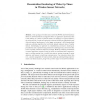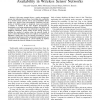427 search results - page 44 / 86 » Revisiting the lifetime of wireless sensor networks |
126
click to vote
PERVASIVE
2008
Springer
14 years 11 months ago
2008
Springer
In energy constrained wireless sensor networks, energy conservation techniques are to be applied in order to maximize the system lifetime. We tackle the problem of increasing netw...
132
click to vote
APCHI
2008
IEEE
15 years 6 months ago
2008
IEEE
Denial of Sleeping is a novel type of potential attacks in wireless network. The object of the attack is a sensor node’s power supply. To make sensors inexpensive so that they ca...
119
click to vote
EWSN
2007
Springer
15 years 11 months ago
2007
Springer
Duty-cycling in wireless sensor networks (WSNs) has both beneficial effects on network lifetime and negative effects on application performance due to the inability of a sensor to ...
INFOCOM
2009
IEEE
15 years 6 months ago
2009
IEEE
— This paper presents Pirrus, a replica management system that addresses the problem of providing data availability on a wireless sensor network. Pirrus uses probabilistic failur...
109
click to vote
IJSNET
2006
14 years 11 months ago
2006
: To extend the functional lifetime of battery-operated Wireless Sensor Networks (WSNs), stringent sleep scheduling strategies with communication duty cycles running at sub-1% rang...


